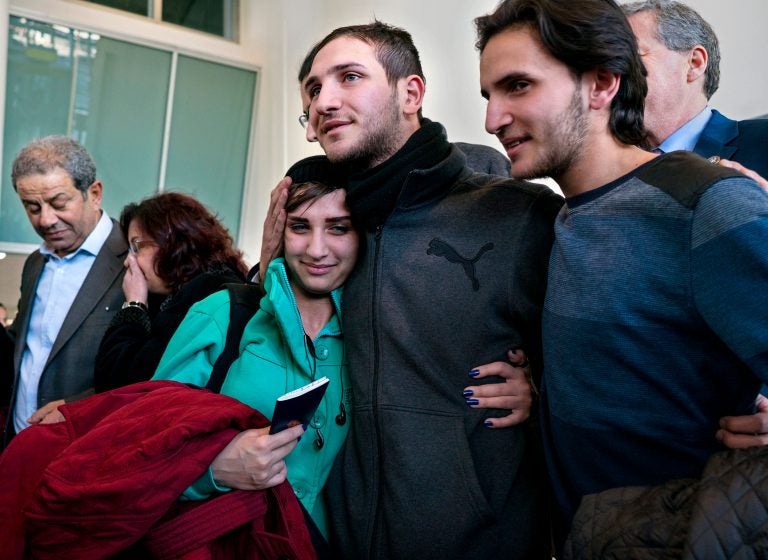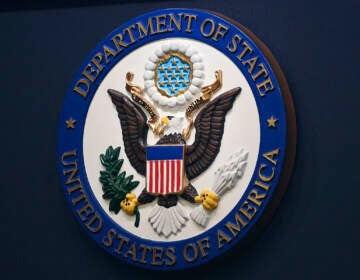Trump administration pauses refugee program in October, delaying dozens of arrivals to Pa.
The moratorium was communicated through the nine volunteer agencies that work with the federal government to place and support refugees at sites across the country.

Syrian refugees arrive at John F. Kennedy International Airport in New York in 2017. (AP Photo/Craig Ruttle)
Between October 1 and October 21, most refugee arrivals to the United States will halt, several resettlement agencies have confirmed to Keystone Crossroads.
At least 29 people from places such as the Democratic Republic of Congo, Senegal and Ukraine were scheduled to move to sites in Pennsylvania during that time.
Their travel is now up in the air. Sixteen Congolese citizens had flights booked to Pittsburgh, from temporary housing in Uganda and Burundi, said Leslie Aizenman, director of refugee and immigrant services at Jewish Family and Community Services.
“We have to notify the relatives here that their families are not coming,” she said. “We’re dreading it and I’m sure they’re not going to be happy.”
The moratorium was communicated through the nine national volunteer agencies that work with the federal government to place and support refugees at sites across the country. These agencies have local partners in Pittsburgh, Harrisburg, Lancaster, Erie, Philadelphia and the Lehigh Valley.
HIAS Pennsylvania, based in Philadelphia, shared an email from the U.S. Department of State regarding upcoming travel to the United States that simply stated “Status: Travel Cancelled.”
The State Department has not yet responded to emailed questions about the moratorium.
A short break in arrivals in October is normal, said Cathryn Miller-Wilson, executive director of HIAS-PA, but pausing for three weeks with no clear plan for how the program will resume “is completely unprecedented.”
Her organization has cancelled seven arrivals slated October — six people from Ukraine and one from Senegal. One category of refugees, known as special immigrant visa holders, will be allowed to arrive during that time.
No refugee cap set for 2020
Resettlement coordinators at several agencies said they hoped refugees will be allowed to come to the United States starting October 22. However, they say they don’t know if that will happen because the federal government has not yet set the annual cap on arrivals for fiscal year 2020.
“Without knowing how many refugees are arriving in the United States, it’s impossible for anyone to make plans… the budgets, the staffing, the number of tickets that will be purchased,” said Miller-Wilson.
Normally, the White House sets a ceiling on the number of refugee arrivals by the end of September, when the federal fiscal year ends, in consultation with various government entities and nonprofit organizations that have a stake in the decision.
National media outlets have reported that members of the Trump administration have advocated lowering the number below the previous cap of 30,000 — or possibly ending the program altogether.
In response to these reports, the Senate Judiciary Committee and House Democrats have asked for input in setting next year’s ceiling.
The White House has called for lower refugee arrivals, pointing to the number of people requesting asylum at the U.S.-Mexico border, which officials say has strained resources.
Some refugee advocates fear the cancellations could lead to families staying in limbo indefinitely.
“This is just insufferably cruel to toy with people’s lives this way,” said Margaret O’Sullivan, executive director of Nationalities Service Center in Philadelphia.
As with other channels of immigration, the path for refugees into the United States has narrowed since 2016.
So far this federal fiscal year, 934 refugees resettled in Pennsylvania according to the most recent numbers available from the Pennsylvania Refugee Resettlement Program. That number is comparable to the 1,065 people who came to live in the commonwealth in 2018, but far fewer than the 2,698 who came in 2017 and the 3,679 who came in 2016.
WHYY is your source for fact-based, in-depth journalism and information. As a nonprofit organization, we rely on financial support from readers like you. Please give today.





